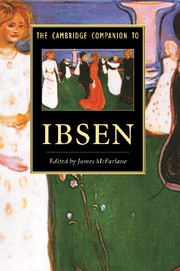Book contents
- Frontmatter
- 1 Ibsen's dramatic apprenticeship
- 2 Ibsen and historical drama
- 3 Dramatic and non-dramatic poetry
- 4 Ibsen and comedy
- 5 Ibsen and the realistic problem drama
- 6 Ibsen and feminism
- 7 The middle plays
- 8 The last plays
- 9 Ibsen's working methods
- 10 Ibsen and the theatre 1877-1900
- 11 Ibsen and the twentieth-century stage
- 12 Ibsen on film and television
- 13 On staging Ibsen
- 14 Ibsen and the drama of today
- 15 A century of Ibsen criticism
- 16 Works of reference
- Index
10 - Ibsen and the theatre 1877-1900
Published online by Cambridge University Press: 28 May 2006
- Frontmatter
- 1 Ibsen's dramatic apprenticeship
- 2 Ibsen and historical drama
- 3 Dramatic and non-dramatic poetry
- 4 Ibsen and comedy
- 5 Ibsen and the realistic problem drama
- 6 Ibsen and feminism
- 7 The middle plays
- 8 The last plays
- 9 Ibsen's working methods
- 10 Ibsen and the theatre 1877-1900
- 11 Ibsen and the twentieth-century stage
- 12 Ibsen on film and television
- 13 On staging Ibsen
- 14 Ibsen and the drama of today
- 15 A century of Ibsen criticism
- 16 Works of reference
- Index
Summary
There can have been few periods of theatrical malaise as extended and as acute as that of the 1870s and early 1880s. Theatre, it was generally agreed by most who wrote about it, did not reflect the intellectual and scientific advances of the nineteenth century, nor did it address the fundamental problems created by an age of industrialization and urbanization. Zola's famous call-to-arms, the essay 'Naturalism in the Theatre' (1880), was but the most inflammatory contribution to what was becoming, by the late 1870s, an escalating critical assault upon the theatre. Zola accused French and, by implication, European drama of being mechanical, superficial, lacking in authentic characters, and perpetuating the outworn cliches of Romanticism. These objections were shared by critics elsewhere. The brothers Hart, leading theorists of the German naturalist movement, bewailed the decadence of German theatre, claiming that no great drama had been written since Schiller and that acting had been in decline since the Napoleonic wars. Everything presented on stage was intended either to complement the 'trivial, shallow taste of the public' or to underpin those values that created a complacent, materialistic society. In England things were little better; Harley Granville-Barker, looking back on the 1880s, suggests that theatre was all 'a rather childish affair'.
- Type
- Chapter
- Information
- The Cambridge Companion to Ibsen , pp. 165 - 182Publisher: Cambridge University PressPrint publication year: 1994
- 1
- Cited by

